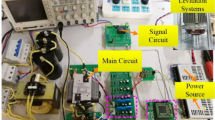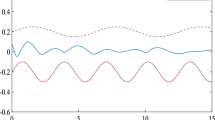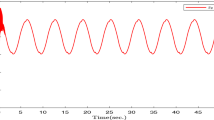Abstract
In this article, a novel fuzzy systems based on adaptive Iterative Learning Control (ILC) strategy is presented to deal with a class of non-parametric nonlinear discrete-time systems which perform iteration-varying reference trajectory tracking. Using the technique of fuzzy systems to compensate for the non-parametric uncertainty of the discrete-time system dynamics, the proposed adaptive ILC scheme can well track the iteration-varying reference trajectory beyond the initial time points. The convergence of the fuzzy systems based adaptive ILC algorithm is guaranteed by theoretical analysis, and a numerical example is given to illustrate the effectiveness of the adaptive ILC scheme.
Similar content being viewed by others
References
S. Arimoto, S. Kawamura, and F. Miyazaki, “Bettering operation of robots by learning,” J. Robot Systems, vol. 1, pp. 123–140, 1984.
H.-S. Ahn, Y. Q. Chen, and K. L. Moore, “Iterative learning control: Brief survey and categorization,” IEEE Trans. on Systems, Man, and Cybernet.-Part C, vol. 37, no. 6, pp. 1099–1121, 2007.
J.-X. Xu, “A survey on iterative learning control,” International Journal of Control, vol. 84, no. 7, pp. 1275–1294, 2011.
T. Manayathara, T. Tsao, J. Bentsman, and D. Ross, “Rejection of unknown periodic load distributors in continuous steel casting process using learning repetitive control approach,” IEEE Trans. on Control Syst. Technol., vol. 4, no. 3, pp. 259–265, 1996.
C.-J. Chien and A. Tayebi, “Further results on adaptive iterative learning control of robot manipulators,” Automatica, vol. 44, pp. 830–837, 2008.
W. Qian, S. K. Panda, and J.-X. Xu, “Speed ripple minimization in PM synchronous motor using iterative learning control,” IEEE Trans. on Energy Conversion, vol. 20, no. 1, pp. 53–61, 2005.
M. Sun, S. S. Ge, and I. M. Y. Mareels, “Adaptive repetitive learning control of robotic manipulators without the requirement for initial repositioning,” IEEE Trans. on Robotics, vol. 22, no. 3, pp. 563–568, 2006.
J.-X. Xu and T. Zhu, “Dual-scale direct learning control of trajectory tracking for a class of nonlinear uncertain systems,” IEEE Trans. on Automatic Control, vol. 44, no. 10, pp. 1884–1888, 1999.
S. S. Saab, W. G. Vogt, and M. H. Mickle, “Learning control algorithms for tracking ‘slowly’ varying trajectories,” IEEE Trans. on Systems, Man, and Cybernetics-Part B: Cybernetics, vol. 27, no. 4, pp. 657–670, 1997.
X. Ruan, Z. Bien, and K.-H. Park, “Decentralized iterative learning control to large-scale industrial processes for nonrepetitive trajectory tracking,” IEEE Trans. on Systems, Man, and Cybernetics-Part A: Systems and Humans, vol. 38, no. 1, pp. 238–252, 2008.
J.-X. Xu and J. Xu, “On iterative learning from different tracking tasks in the presence of timevarying uncertainties,” IEEE Trans. on Systems, Man, and Cybernetics- Part B: Cybernetics, vol. 34, no. 1, pp. 589–597, 2004.
X.-D. Li, T. W. S. Chow, and L. L. Cheng, “Adaptive iterative learning control of non-linear MIMO continuous systems with iteration-varying initial error and reference trajectory,” International Journal of Systems Science, vol. 44, no. 4, pp. 786–794, 2013.
C.-J. Chien, “A combined adaptive law for fuzzy iterative learning control of nonlinear systems with varying control tasks,” IEEE Trans. on Fuzzy Systems, vol. 16, no. 1, pp. 40–51, 2008.
R. Chi, Z. Hou, and J.-X. Xu, “Adaptive ILC for a class of discrete-time systems with iteration-varying trajectory and random initial condition,” Automatica, vol. 44, pp. 2207–2213, 2008.
X.-D. Li, T.-F. Xiao, and H.-X. Zheng, “Adaptive discrete-time iterative learning control for nonlinear multiple input multiple output systems with iteration-varying initial error and reference trajectory,” IET Control Theory and Applications, vol. 5, no. 9, pp. 1131–1139, 2011.
M. Sun and D. Wang, “Analysis of nonlinear discrete-time systems with higher-order iterative learning control,” Dynamics and Control, vol. 11, no. 1, pp. 81–96, 2001.
L. X. Wang, Adaptive Fuzzy Systems and Control: Design and Stability Analysis, Prentice Hall, Englewood Cliffs, NJ, 1994.
H. Li, J. Yu, C. Hilton, and H. Liu, “Adaptive sliding mode control for nonlinear active suspension systems using T-S fuzzy model,” IEEE Trans. on Industrial Electronics, vol. 60, no. 8, pp. 3328–3338, 2013.
Y.-J. Liu, S. Tong, and C. L. P. Chen, “Adaptive fuzzy control via observer design for uncertain nonlinear systems with unmodeled dynamics,” IEEE Trans. on Fuzzy Systems, vol. 21, no. 2, pp. 275–288, April 2013.
Y.-J. Liu and S. Tong, “Adaptive fuzzy control for a class of nonlinear discrete-time systems with backlash,” IEEE Trans. on Fuzzy Systems, vol. 22, no. 5, pp. 1359–1364, 2014.
Y.-J. Liu, C. L. P. Chen, G.-X, Wen, and S. Tong, “Adaptive neural output feedback tracking control for a class of uncertain discrete-time nonlinear systems,” IEEE Trans. on Neural Networks, vol. 22, no. 7, pp. 1162–1167, 2011.
C. Yang, S. S. Ge, C. Xiang, T. Chai, and T. H. Lee, “Output feedback NN control for two classes of discrete-time systems with unknown control directions in a unified approach,” IEEE Trans. on Neural Networks, vol. 19, no. 11, pp. 1873–1886, 2008.
Author information
Authors and Affiliations
Corresponding author
Additional information
Teng-Fei Xiao received his B.S. and M.Phil. degrees from the School of Information Science and Technology, Sun Yat-sen University, Guangzhou, China, in 2009 and 2012, respectively. His research interests include iterative learning control and control of distributed parameter system.
Xiao-Dong Li received his B.S. degree from the Department of Mathematics, Shaanxi Normal University, Xian, China, in 1987, the M.Phil. degree from the Nanjing University of Science and Technology, Nanjing, China, in 1990, and the Ph.D. degree from the City University of Hong Kong, Hong Kong, in 2007. He is currently a Professor in the School of Information Science and Technology, Sun Yat-sen University, Guangzhou, China. His research interests include 2-D system theory, iterative learning control, and artificial intelligence.
John K. L. Ho received his BSc & MSc degrees in Computer, Control Engineering from the Coventry University and his Ph.D. degree from the University of East London, UK. He has many years design experience in the field of automation when was working in GEC Electrical Projects Ltd in UK. Currently, he is an Associate Professor in the Department of Mechanical and Biomedical Engineering, City University of Hong Kong. His research interests are in the fields of control engineering, enterprise automation and product design.
Rights and permissions
About this article
Cite this article
Xiao, TF., Li, XD. & Ho, J.K.L. An adaptive discrete-time ILC strategy using fuzzy systems for iteration-varying reference trajectory tracking. Int. J. Control Autom. Syst. 13, 222–230 (2015). https://doi.org/10.1007/s12555-013-0474-1
Received:
Revised:
Accepted:
Published:
Issue Date:
DOI: https://doi.org/10.1007/s12555-013-0474-1




